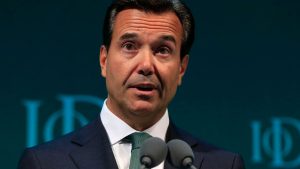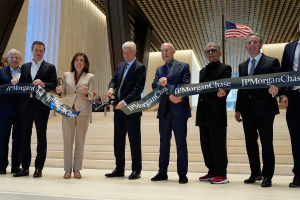
Education
As cryptocurrency and artificial intelligence (AI) reshape global finance, Jonathan Gould, the U.S. Comptroller of the Currency, is urging regulators to strike a balance between innovation and oversight. Speaking with Banking Dive at the Money20/20 conference in Las Vegas, Gould emphasized that turning away from emerging technologies would be shortsighted.
“My view is that it’s better for it to be done within the banking system—if it’s legally permissible and safe—so that we can see it and monitor it,” Gould said. “That’s what the banking system is designed to do.”
Under Gould’s leadership, the Office of the Comptroller of the Currency (OCC) is steering away from what he calls an “ostrich approach,” in which regulators ignore disruptive technologies like cryptocurrency and AI. Instead, he advocates for a “balanced approach” that allows innovation to develop within a regulated environment.
His stance marks a notable shift in tone. The OCC, alongside other federal agencies, has become more crypto-friendly since President Donald Trump returned to office earlier this year. Major firms—including Coinbase, Circle, Paxos, and Ripple—have applied for national trust charters that would allow them to operate within the U.S. banking system while maintaining regulatory clarity.
“It’s in our interest to be transparent about our expectations and evaluate firms case by case,” Gould said. “A blanket ‘risk elimination’ approach is naive. If the banking system refuses to meet market needs, others in the financial sector will.”
Gould brings first-hand experience to the conversation. During his previous OCC tenure (2018–2021), the agency approved the first-ever crypto bank charter. He later served as chief legal officer at blockchain company Bitfury before joining law firm Jones Day.
He acknowledges the volatility of crypto assets but views them as an important—and enduring—part of modern finance. “Volatility doesn’t mean it’s not an important asset class,” he said. “People just need to understand the risks before investing.”
Gould believes digital assets and traditional banking are no longer adversaries: “Ten years ago it was banks versus fintechs. Now those lines are converging.”
Beyond crypto, Gould is optimistic about the role of artificial intelligence in banking. He sees potential for AI to “level the playing field” between smaller banks and large institutions by improving risk management, credit decisioning, and digital banking efficiency.
“We’re trying to take a more balanced approach and not just focus on a parade of horribles,” Gould said. “Failure to innovate is itself a risk—to banks and to the U.S. economy.”
As the financial system evolves, Gould’s leadership reflects a broader regulatory trend: acknowledging that innovation and stability are not opposites, but partners. By integrating emerging technologies like crypto and AI into the regulated space, the OCC aims to ensure that banking innovation supports long-term economic growth, customer trust, and financial security.
Category: 🏦 Finance
Would you like me to format this into an SEO-ready HTML version for your SKN site (with <h2> tags, bold formatting, meta description, and keyword placement for “AI in banking,” “crypto regulation,” and “digital banking”)?
 Previous Post
Previous Post
SKN | Former Lloyds Chief António Horta-Osório Returns to Banking Leadership Spotlight
 Next Post
Next Post
SKN | UK Businesses Lose £56 Billion a Year to Inefficient Payment Systems, Study Finds

January 10, 2026

December 31, 2025

December 30, 2025

December 4, 2025